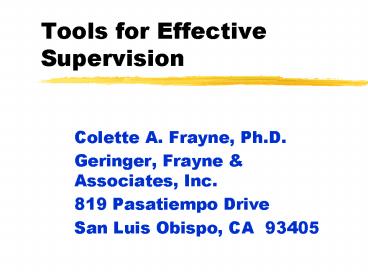Tools for Effective Supervision - PowerPoint PPT Presentation
1 / 13
Title: Tools for Effective Supervision
1
Tools for Effective Supervision
- Colette A. Frayne, Ph.D.
- Geringer, Frayne Associates, Inc.
- 819 Pasatiempo Drive
- San Luis Obispo, CA 93405
2
Myers-Briggs Type Indicator
Where do you look for data? Extroversion Int
roversion What kind of data do you use?
Sensing Intuition How do you process the
information? Thinking Feeling What do you
do with the information? Judging Perceiving
3
(E) Extraversion Vs. (I) Introversion
Extraverts - Primary source of energy is from the
world outside the self figure things out by
talking them over Introverts - Primary source of
energy is from the world inside the self
figure things out by thinking them over
4
(S) Sensation Vs. (N) Intuition
Sensors - Believe in experience and trust
facts Intuitors - Tend to act on intuition,
despite what the facts say
5
(T) Thinking Vs. (F) Feeling
Thinkers - Most comfortable with decisions based
on objective, logical criteria Feelers - Favor
personal bases for choice, reacting to
subjective, emotional criteria
6
(P) Perceiving Vs. (J) Judging
Perceivers - Resist making decisions once made,
may be uneasy with them tend to push out
deadlines Judgers - Feel anxious when decisions
are not made tend to live by deadlines
7
Where Do You Look for Data?
Extraversion Interacting with people and the
environment Action Variety
Introversion Contemplating ideas, and
experiences Reflection Concentration
Strengths
Gathering information from others and the
environment Involving others Persuading
others Objective/grounded
Dealing with ideas and thoughts Individual
insight Planning Conceptualization
8
How Do You Process Information?
Thinking Logical analysis Rationality Fairness T
rue or false
Feeling Impact on people Values Likes and
dislikes Right or wrong
Strengths
Motivating Recognizing
Planning Rewarding
9
What Kind of Data Do You Use?
Sensing Facts Tangible data Details
Intuition Concepts Abstractions Possibilities
Strengths
Gathering evidence Taking action
Perceiving relationships Visioning
10
What Do You Do With Information?
Judging Fix the World Follow through Plan Closure
Perceiving Experience the world Initiate Adapt Ope
n ended
Strength
Reach a resolution Make it happen
Consider all sides Let it happen
11
People Need Each Other (1)
Thinking Types Need Feeling Types
To Persuade Conciliate Anticipate
feelings Teach and counsel Arouse
enthusiasm Create excitement for new
ideas Feeling Types Need Thinking Types
To Analyze Organize Weigh the evidence Find
the flaws in advance Hold to a policy Stand firm
against opposition
12
People Need Each Other (2)
Sensing Types Need Intuitive Types To See
Possibilities Supply ingenuity Simplify
complexity Explain what has been
realized Intuitive Types Need Sensing Types
To Bring up pertinent facts Check the
details Anticipate practical problems Assume
task responsibilities Take action to implement
13
Cognitive Preference and Behaviors
Cognitive Preference Intuition Feeling Thinking Se
nsation
Concerned with Possibilities patterns,
ideas People values Cause effect,
facts Activities, events
Tends to be Ingenious integrative Enthusiastic
insightful Reliable orderly Adaptable
practical































